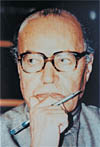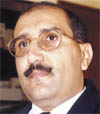Sheikh Ali Bukair: “Dividing Hadhramaut has many dangers.” [Archives:1997/46/Interview]
Sheikh Ali Salim Bukair is a member of the Consultative Council’s Committee for Education, Culture, Tourism and Information. As a leading member in the Yemeni Congregation for Reform (Islah), Sheikh Bukair, 57, is the president of the Islah Shoura Committee in Hadhramaut. Born and raised in Tareem – Hadhramaut’s famous center of religious scholarly learning, Sheikh Bukair studied theology and law in the town’s mosques and traditional religious institutes. He was taught by Tareem’s most famous scholars, including his father who headed the council of ‘sharia fatwa’ or religious edicts. Sheikh Bukair worked as a teacher and later became the curator of the Ahqaf Library, which was formed by a number of religious scholars to serve students of Islamic studies. Ahqaf contained many priceless old manuscripts which offered an invaluable source of information for the Muslim students worldwide. Dr. Abdulaziz Al-Saqqaf met Sheikh Bukair to talk about various important issues in Yemen’s political life. Excerpts:
Q: You strongly opposed the proposed division of Hadhramaut into two governorates within the new administrative re-zoning of the country. Could you tell us why? A: Let me start by saying that it is actually up to those who want to change the status quo to tell why they want the change. There is no doubt that this issue has been politicized, and directed away from its true objective path. From my personal point of view, I believe Hadhramaut must remain as one entity. This view is also shared by most people in that area, especially the leading politicians and intellectuals. All of the five Hadhrami members in the Consultative Council oppose the division. Out of the 17 Hadhrami MPs, 14 have also frankly and openly declared their opposition. Dividing Hadhramaut has many dangers. If those who want to divide the region claim it is to be done for purely administrative reasons, such as facilitating the provision of services and utilities, then this can be done whether Hadhramaut is one entity or divided. Hospitals, schools, courts of law, etc, can be provided in various parts of Hadhramaut such as Seioun, Thamoud, and other areas. This will save people the trouble of over-centralization; i.e., having to go to Mukallah (Hadhramaut’s coastal capital) in order to finish their paperwork with officialdom. If we really want the good of the people, we can just as well provide them with the necessary official establishments and essential services in their own areas. This can surely be done whether Hadhramaut is one governorate or more. In other words, the vast area of the governorate cannot be taken as a justification for its division. Dividing Hadhramaut will only lead to untold dangers and apprehensions. It will help re-awaken some old sectarian feuds that have historical roots, but are long since forgotten. Not many people may realize the extent of such dangers and their historical basis. Hadhramaut must remain one entity. This is the age of large blocs and entities, not of division. It must remain unified within a unified Yemen. I cannot over emphasize this point. A 100-member delegation consisting of Hadhrami people, of diverse backgrounds and from various segments of society and different regions in Hadhramaut, has arrived in Sanaa. They have put their case to President Ali Abdullah Saleh and other high-ranking officials in the government, who were quite understanding and sympathetic.
Q: But don’t you think that the decision to divide Hadhramaut had already been taken? Or is there still space for annulment? A: A final decision regarding this issue has not been taken yet. It is still a proposal to be studied thoroughly. The citizen’s interest must remain above all the other considerations.
Q: How are the current conditions in Hadhramaut? How do people live? A: Several malicious attacks on Yemen’s unity have lately come to the surface, not only in Hadhramaut but also in other regions in the country. Some people, for their own ulterior motives, are trying to reawaken or revive old sectarian and regional divisions. These attempts are probably aided by some clandestine parties.
Q: Are these parties local or foreign? A: They are supported by internal and external powers. Some people respond to these malicious calls, especially those who are still vexed by the victory of unity achieved by the Yemeni people on July 7, 1994. These acts are perpetrated by hateful people who don’t want Yemen to enjoy peace and stability. Whenever the nation resolves one of its major problems, they try to make another one flare up. Blood and land feuds, for example, which have disappeared from Hadhramaut society are coming back to the forefront. There are some people behind these disturbing problems. Some of these issues are being raised through quite illegal means such as usurpation, blackmail, greed, etc. Some people seem to have forgotten how to be satisfied with their own rights and started infringing on the rights of others.
Q: How about the people’s living conditions in Hadhramaut? A: Living standards in Hadhramaut might be relatively better than in some other areas in Yemen. This can be attributed to the fact that there is a large Hadhrami migrant community who provide financial assistance for the people left at home. Those migrants still have very strong connections with their kinsmen in Hadhramaut. However, the inflow of financial help has decreased lately due perhaps to overall change in the people’s living standards abroad. Generally speaking, however, people in Hadhramaut are better off than in other governorates.
Q: Let’s now talk about the Consultative Council. How do view its performance during the last six months since its establishment? A: The best thing about the Consultative Council, I believe, is that it comprises the creme de la creme of Yemeni society. All its members are either highly educated and successful professionals or have wide experience and solid cultural backgrounds. I think that President Ali Abdullah Saleh was quite successful in choosing the right people for the job. We all hope that the Consultative Council will be very successful in achieving the goals and tasks for which it was established.
Q: As a whole, are you satisfied with the Consultative Council’s performance up to now? A: Although the past period of the Consultative Council’s existence is not long enough to be able to fully evaluate its performance, it is increasingly and rapidly improving. We can judge that through the good positions reached by the Consultative Council regarding some of the draft laws submitted to it, such as that concerning blood feuds and carrying arms. It has successfully tackled several crucial issues, and provided rather good advice to our country’s top decision makers.
Q: Do you think that there should be some sort of coordination between the Consultative Council, parliament and other bodies? A: There is no doubt that a certain degree of coordination between parliament and the Consultative Council is a must, especially in view of the current rift between the two bodies. Some people in parliament wrongly think that the Consultative Council is a substitute for parliament, or that it has taken over some of its authorities. This is definitely not true. There is a big difference between the tasks of the two. Parliament is a legislative assembly; while, the Consultative Council’s job is to provide advice to the country’s decision makers.
Q: How do you see the development of political life in Yemen? A: The fledgling democratic experience in Yemen is rather successful. It must be given the opportunity to develop further, and widen its popular base. Compared to many other Arab countries, Yemenis are enjoying quite a big margin of freedom and democracy. Freedom of self expression and freedom of the press are certainly better than in many parts of the Arab world and the Middle East in general. The number of non-official partisan and independent newspapers and other publications being currently published would attest to this fact. The democratic experience in Yemen, however, needs to be more developed. There are some shortcomings that need to be addressed. Every experience in every part of the world would have its accompanying faults and mistakes. But the important thing is to learn from, and later rectify, these mistakes. You don’t learn if you don’t work and make mistakes. I call upon all people concerned with democracy in Yemen, official or otherwise, to nurture this new experiment in our lives. Once successful, other Arab countries will most certainly like to follow and emulate the Yemeni experience.
Q: How do you evaluate the economic reform program? A: On its own, the economic reform program is just not sufficient. It has to be accompanied by a thorough administrative reform program. The evaluation of any sort of activity can only be done through its outcome and other manifestations in people’s lives. Up to now, the results of economic reform are hardly positively noticeable. It may even be the reverse of that. Many people are now starting to feel the pangs of this reform program. Prices have risen and a large proportion of the population is now suffering from many hardships. Very few have benefited. All governmental bodies must channel their efforts towards implementing a comprehensive reform program that will cover all areas of the people’s life, not just the economy. There must be administrative, judicial and social reforms as well. Corruption in all its forms must be combated on all levels.
Q: Do you have any last comment? A: We must at all time be aware of the dangers that threaten out country. They must be confronted at their early stages and never allowed to become more powerful. Everyone must fully bear his or her responsibility, especially our officials who have that responsibility bestowed on them by the Almighty Allah. The prophet said, “each and every one of you is a shepherd and is responsible for his own flock.” I advise all my brothers who are in positions of making decisions to observe the commands of Allah in all their doings. Responsibility is not a privilege. It is a trust given to the officials by Allah, and must be greatly taken care of. I hope all will be successful in serving this country.
——
[archive-e:46-v:1997-y:1997-d:1997-11-17-p:./1997/iss46/intrview.htm]


